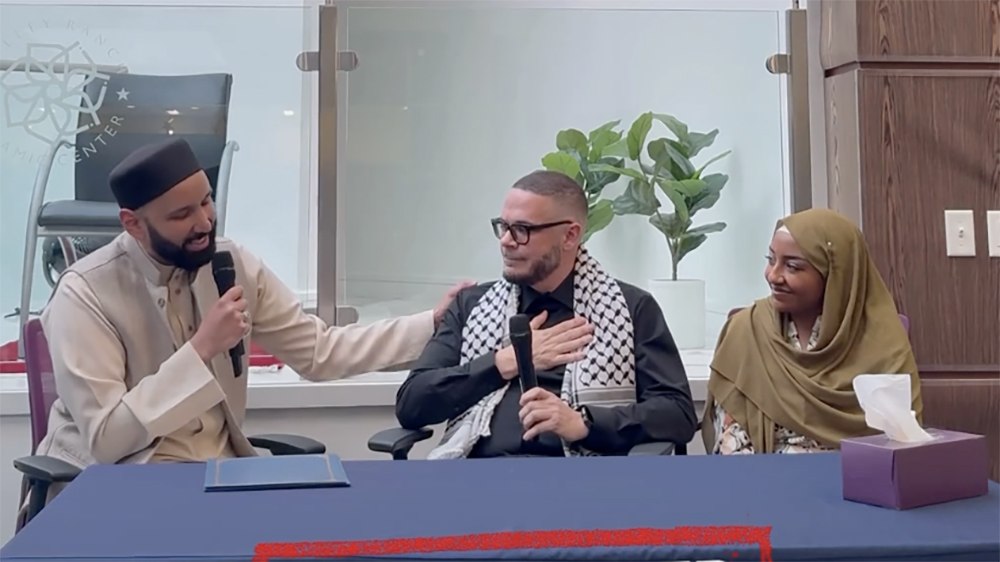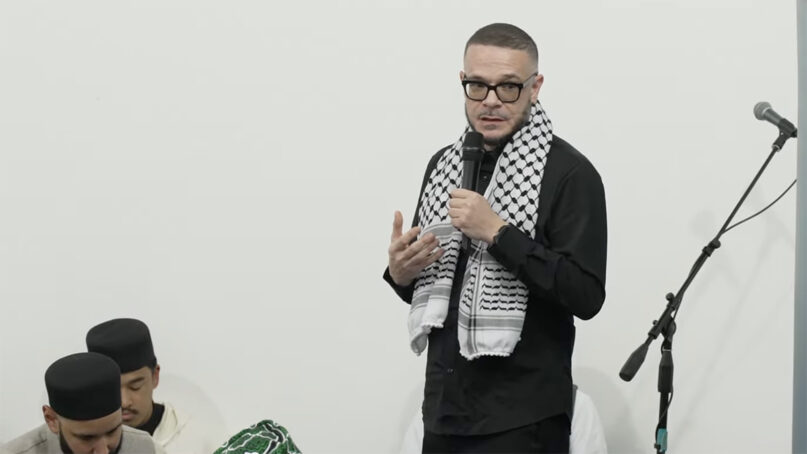(RNS) — Shaun King, a onetime Christian pastor who has sparked controversy in the past with his strident liberal activism, converted to Islam with his wife, Rai, over the weekend.
Video of King saying the shahada, the Muslim profession of faith, appeared on X Sunday evening, as did separate footage of him speaking about his embrace of Islam at the Valley Ranch Islamic Center in Irving, Texas.
In various clips, King was accompanied by Omar Suleiman, founder of the Yaqueen Institute and imam at VRIC (and a Religion News Service columnist). Suleiman noted that he and King have had “multiple discussions” about faith over the course of nearly a decade, before offering the microphone to King to explain the timing of his conversion.
“More than anything it’s been friendship, sincere friendship, and just the deep ocean of faith of the Palestinian people that’s moved my heart,” said King, who has become active in the cause of supporting Palestinian rights since Israel began its ground assault into the Gaza Strip in retaliation for the Oct. 7 attacks.
Immediately before King said the shahada, Suleiman stressed that, upon making the declaration of faith, “Islam does away with everything that comes before, and so every sin that you have committed, any wrong, any mistakes up until this moment, are completely forgiven.”

Imam Omar Suleiman, left, with Shaun and Rai King at the Valley Ranch Islamic Center in Irving, Texas. (Video screen grab)
Efforts to reach King for comment about his conversion were unsuccessful.
An author and activist with a large online following, King was the pastor of Courageous Church in Atlanta, Georgia, from 2008 to 2011 before becoming a full-time advocate for racial justice. For much of the 2010s he was a prominent figure in the Black Lives Matter movement: He drew notice for his use of digital sleuthing techniques to identify and track down participants in the deadly 2017 Unite the Right rally in Charlottesville, Virginia, posting them online and reporting them to law enforcement.
Three years later, he caused a furor by calling for depictions of Jesus as white to be torn down as part of the movement to remove Confederate monuments in public spaces around the country. White Jesus, he argued, was a “form of white supremacy.”
Much of his recent controversy stemmed from his efforts to raise money to support various new ventures. In 2020, he made appeals for funds to launch a revival of Frederick Douglass’ newspaper The North Star, but his bold aspirations failed to materialize. More recently, he touted his clothing line, A Real One, that some labeled a scam after he had trouble filling orders.
King has rebuffed these and other allegations, calling, for instance, the clothing line allegations a “complete fabrication.” In 2019 he invited a team to conduct a review of his fundraising efforts.
His Grassroots Law Project, a nonprofit that amassed millions of dollars in donations following the murder of George Floyd by a police officer in 2020, has also drawn attention. An investigation by the Daily Beast cited findings indicating that, while the organization’s efforts to “redress prosecutorial injustices” fell short, “King himself and his associates raked in hundreds of thousands of dollars in compensation.” (The Grassroots Law Project called the article “inaccurate and extraordinarily misleading.”)
Over the past few months, King has increasingly focused on the Israel-Hamas war, leading fundraising efforts aimed at helping Palestinian families in Gaza and railing in social media posts against the Israeli ground assault in response to Hamas’ attacks that has killed more than 30,000 people. He is among those who filed suit against Meta, the parent company of Instagram, which King has accused of banning him from the platform because he was “fighting for Palestine.”
In a separate statement, King said he was banned following the posting of an open letter thanking the “men of Yemen” for “doing anything and everything they know to do to stop the horrific genocide of the Palestinian people.” The message appeared around the same time Iranian-backed Houthi rebels in Yemen were staging attacks on commercial cargo ships in the Red Sea.
More controversy bubbled up after King claimed he was among dozens who had “worked frantically behind the scenes” to secure the release of Judith Raanan and her daughter, Natalie Raanan, two U.S. hostages taken by Hamas. Members of the Ranaan family, particularly irked that he had suggested that the family supported his anti-Israeli message on social media, accused him of lying. King countered by revealing that a brother of the hostages had been in contact with him, but the family insisted “We are not affiliated with Mr. King.”
In a Facebook post announcing his conversion to Islam, King connected his conversion, which took place just before Ramadan, the holy month in which Muslims intensively fast and pray, to his activism.
“My heart is with my dearest friends in Gaza and I’m proud that we were able to provide meals tonight to thousands and thousands of families from the North to the South in Gaza and will do so every day of Ramadan,” King wrote.





